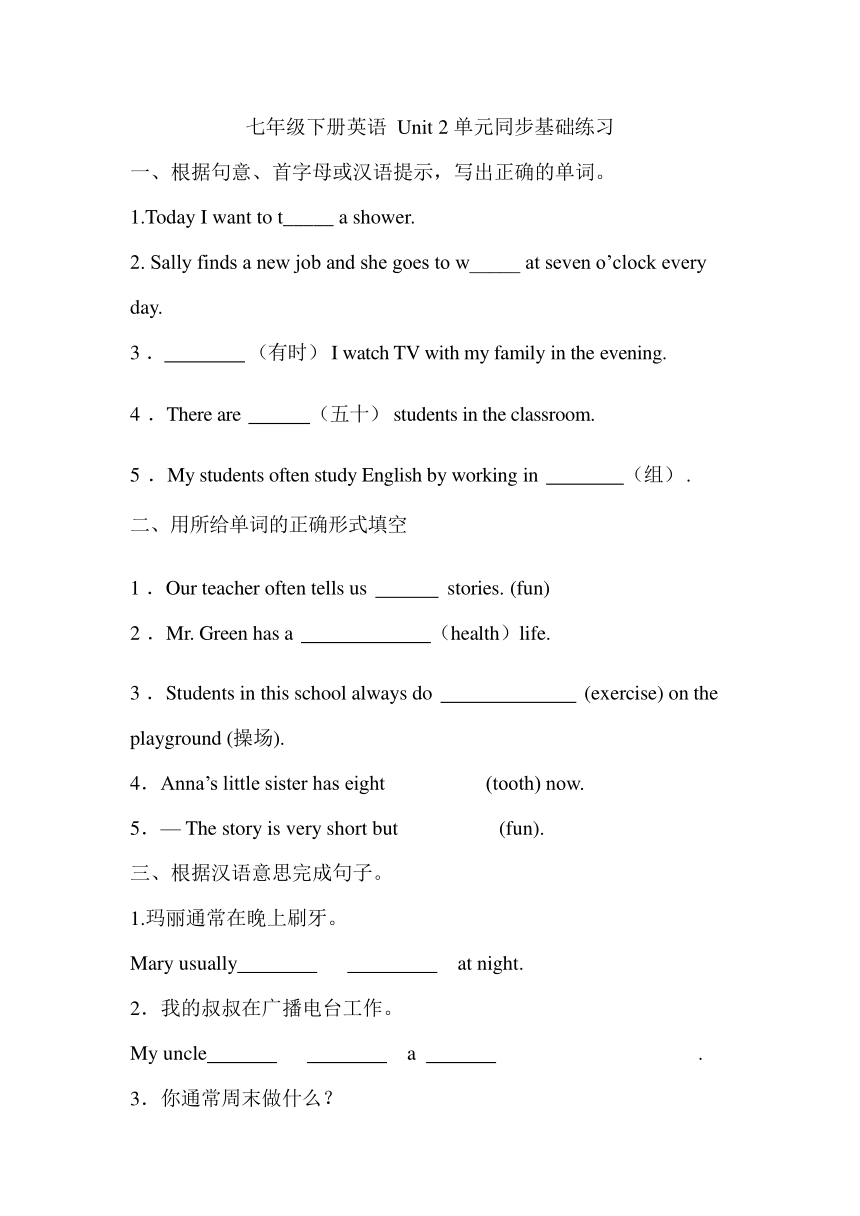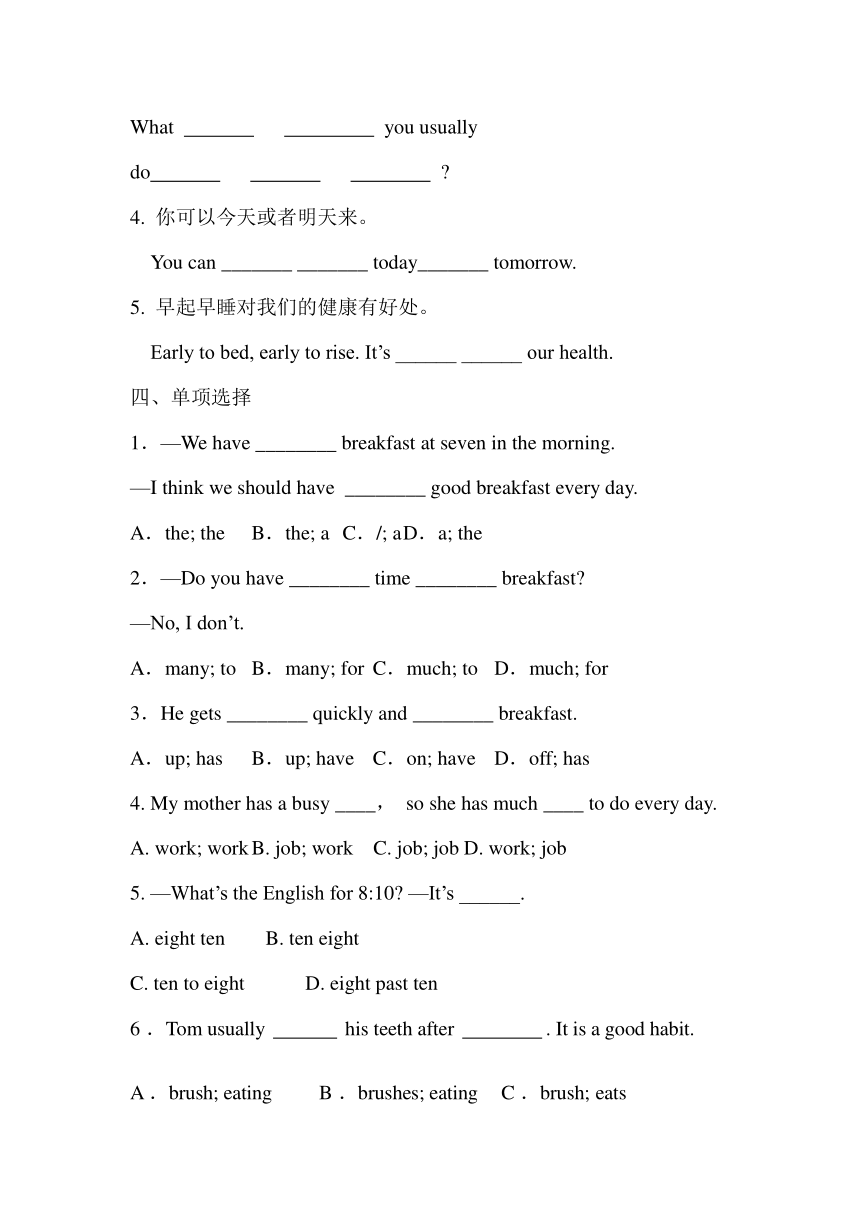人教版七年级下册Unit 2 What time do you go to school?单元同步基础练习(无答案)
文档属性
| 名称 | 人教版七年级下册Unit 2 What time do you go to school?单元同步基础练习(无答案) |

|
|
| 格式 | docx | ||
| 文件大小 | 17.4KB | ||
| 资源类型 | 教案 | ||
| 版本资源 | 人教新目标(Go for it)版 | ||
| 科目 | 英语 | ||
| 更新时间 | 2024-03-12 13:47:04 | ||
图片预览


文档简介
七年级下册英语 Unit 2单元同步基础练习
一、根据句意、首字母或汉语提示,写出正确的单词。
1.Today I want to t_____ a shower.
2. Sally finds a new job and she goes to w_____ at seven o’clock every day.
3 . (有时) I watch TV with my family in the evening.
4 .There are (五十) students in the classroom.
5 .My students often study English by working in (组) .
二、用所给单词的正确形式填空
1 .Our teacher often tells us stories. (fun)
2 .Mr. Green has a (health)life.
3 .Students in this school always do (exercise) on the playground (操场).
4.Anna’s little sister has eight (tooth) now.
5.— The story is very short but (fun).
三、根据汉语意思完成句子。
1.玛丽通常在晚上刷牙。
Mary usually at night.
2.我的叔叔在广播电台工作。
My uncle a .
3.你通常周末做什么?
What you usually do
4. 你可以今天或者明天来。
You can _______ _______ today_______ tomorrow.
5. 早起早睡对我们的健康有好处。
Early to bed, early to rise. It’s ______ ______ our health.
四、单项选择
1.—We have ________ breakfast at seven in the morning.
—I think we should have ________ good breakfast every day.
A.the; the B.the; a C./; a D.a; the
2.—Do you have ________ time ________ breakfast
—No, I don’t.
A.many; to B.many; for C.much; to D.much; for
3.He gets ________ quickly and ________ breakfast.
A.up; has B.up; have C.on; have D.off; has
4. My mother has a busy ____, so she has much ____ to do every day.
A. work; work B. job; work C. job; job D. work; job
5. —What’s the English for 8:10 —It’s ______.
A. eight ten B. ten eight
C. ten to eight D. eight past ten
6 .Tom usually his teeth after . It is a good habit.
A .brush; eating B .brushes; eating C .brush; eats D .brushes; to eat
7 .—Can you come here at a quarter ten
—Yes, I can be there at 9:45.
A .past B .to C .after D .before
8 .Either you or Mike stories to us.
A .tell B .say C .tells D .says
9. Time goes , so we should cherish(珍惜) it and make good use of it.
A.quickly B. early C. lastly D. late
10.— do you usually go to the club —On Saturdays.
A. Why B. How C. When D. What time
五、阅读理解
In British schools, teenagers have “food technology”, or cooking classes. Perhaps you think this is strange. School is for math and science, isn’t it
The idea is that young people learn life skills. When they leave home they can eat without dining in McDonalds every day!
I remember when I took cookery classes I was taught simple dishes like meatloaf (肉饼). I took the things I needed to cook the meal in class. Then I took the dish home for my family.
But sometimes things went wrong. It’s difficult to carry food around in your school bag. The dish can spill (溢出) about and make a real mess. Food on textbooks and homework!
But I learned how to cook. And it’s great to be able to make something for your family to enjoy.
1.Why do teenagers have food technology or cookery classes in Britain
A.To encourage them to eat healthy food.
B.To help them have a life skill.
C.To develop their interest in cooking.
D.To help them relax themselves after class.
2.What dish did the writer learn to cook in class
A.Meatloaf. B.Pancake. C.Noodles. D.Fish and chips.
3.What was the big problem to the writer in cookery classes
A.How to use cookers. B.How to make the dish delicious.
C.How to carry food around in his school bag. D.How to learn difficult dishes.
4.What happened when he uses his schoolbag to carry food
A.The dish spilt and made a mess.
B.The dish went bad.
C.The smell of the food made his schoolbag smelly.
D.His schoolbag was lost by accident.
5.Whom did the writer share his dish with
A.His friend. B.His teacher. C.His family. D.His classmate.
一、根据句意、首字母或汉语提示,写出正确的单词。
1.Today I want to t_____ a shower.
2. Sally finds a new job and she goes to w_____ at seven o’clock every day.
3 . (有时) I watch TV with my family in the evening.
4 .There are (五十) students in the classroom.
5 .My students often study English by working in (组) .
二、用所给单词的正确形式填空
1 .Our teacher often tells us stories. (fun)
2 .Mr. Green has a (health)life.
3 .Students in this school always do (exercise) on the playground (操场).
4.Anna’s little sister has eight (tooth) now.
5.— The story is very short but (fun).
三、根据汉语意思完成句子。
1.玛丽通常在晚上刷牙。
Mary usually at night.
2.我的叔叔在广播电台工作。
My uncle a .
3.你通常周末做什么?
What you usually do
4. 你可以今天或者明天来。
You can _______ _______ today_______ tomorrow.
5. 早起早睡对我们的健康有好处。
Early to bed, early to rise. It’s ______ ______ our health.
四、单项选择
1.—We have ________ breakfast at seven in the morning.
—I think we should have ________ good breakfast every day.
A.the; the B.the; a C./; a D.a; the
2.—Do you have ________ time ________ breakfast
—No, I don’t.
A.many; to B.many; for C.much; to D.much; for
3.He gets ________ quickly and ________ breakfast.
A.up; has B.up; have C.on; have D.off; has
4. My mother has a busy ____, so she has much ____ to do every day.
A. work; work B. job; work C. job; job D. work; job
5. —What’s the English for 8:10 —It’s ______.
A. eight ten B. ten eight
C. ten to eight D. eight past ten
6 .Tom usually his teeth after . It is a good habit.
A .brush; eating B .brushes; eating C .brush; eats D .brushes; to eat
7 .—Can you come here at a quarter ten
—Yes, I can be there at 9:45.
A .past B .to C .after D .before
8 .Either you or Mike stories to us.
A .tell B .say C .tells D .says
9. Time goes , so we should cherish(珍惜) it and make good use of it.
A.quickly B. early C. lastly D. late
10.— do you usually go to the club —On Saturdays.
A. Why B. How C. When D. What time
五、阅读理解
In British schools, teenagers have “food technology”, or cooking classes. Perhaps you think this is strange. School is for math and science, isn’t it
The idea is that young people learn life skills. When they leave home they can eat without dining in McDonalds every day!
I remember when I took cookery classes I was taught simple dishes like meatloaf (肉饼). I took the things I needed to cook the meal in class. Then I took the dish home for my family.
But sometimes things went wrong. It’s difficult to carry food around in your school bag. The dish can spill (溢出) about and make a real mess. Food on textbooks and homework!
But I learned how to cook. And it’s great to be able to make something for your family to enjoy.
1.Why do teenagers have food technology or cookery classes in Britain
A.To encourage them to eat healthy food.
B.To help them have a life skill.
C.To develop their interest in cooking.
D.To help them relax themselves after class.
2.What dish did the writer learn to cook in class
A.Meatloaf. B.Pancake. C.Noodles. D.Fish and chips.
3.What was the big problem to the writer in cookery classes
A.How to use cookers. B.How to make the dish delicious.
C.How to carry food around in his school bag. D.How to learn difficult dishes.
4.What happened when he uses his schoolbag to carry food
A.The dish spilt and made a mess.
B.The dish went bad.
C.The smell of the food made his schoolbag smelly.
D.His schoolbag was lost by accident.
5.Whom did the writer share his dish with
A.His friend. B.His teacher. C.His family. D.His classmate.
同课章节目录
- Unit 1 Can you play the guitar?
- Section A
- Section B
- Unit 2 What time do you go to school?
- Section A
- Section B
- Unit 3 How do you get to school?
- Section A
- Section B
- Unit 4 Don't eat in class.
- Section A
- Section B
- Unit 5 Why do you like pandas?
- Section A
- Section B
- Unit 6 I'm watching TV.
- Section A
- Section B
- Review of Units 1-6
- Unit 7 It's raining!
- Section A
- Section B
- Unit 8 Is there a post office near here?
- Section A
- Section B
- Unit 9 What does he look like?
- Section A
- Section B
- Unit 10 I'd like some noodles.
- Section A
- Section B
- Unit 11 How was your school trip?
- Section A
- Section B
- Unit 12 What did you do last weekend?
- Section A
- Section B
